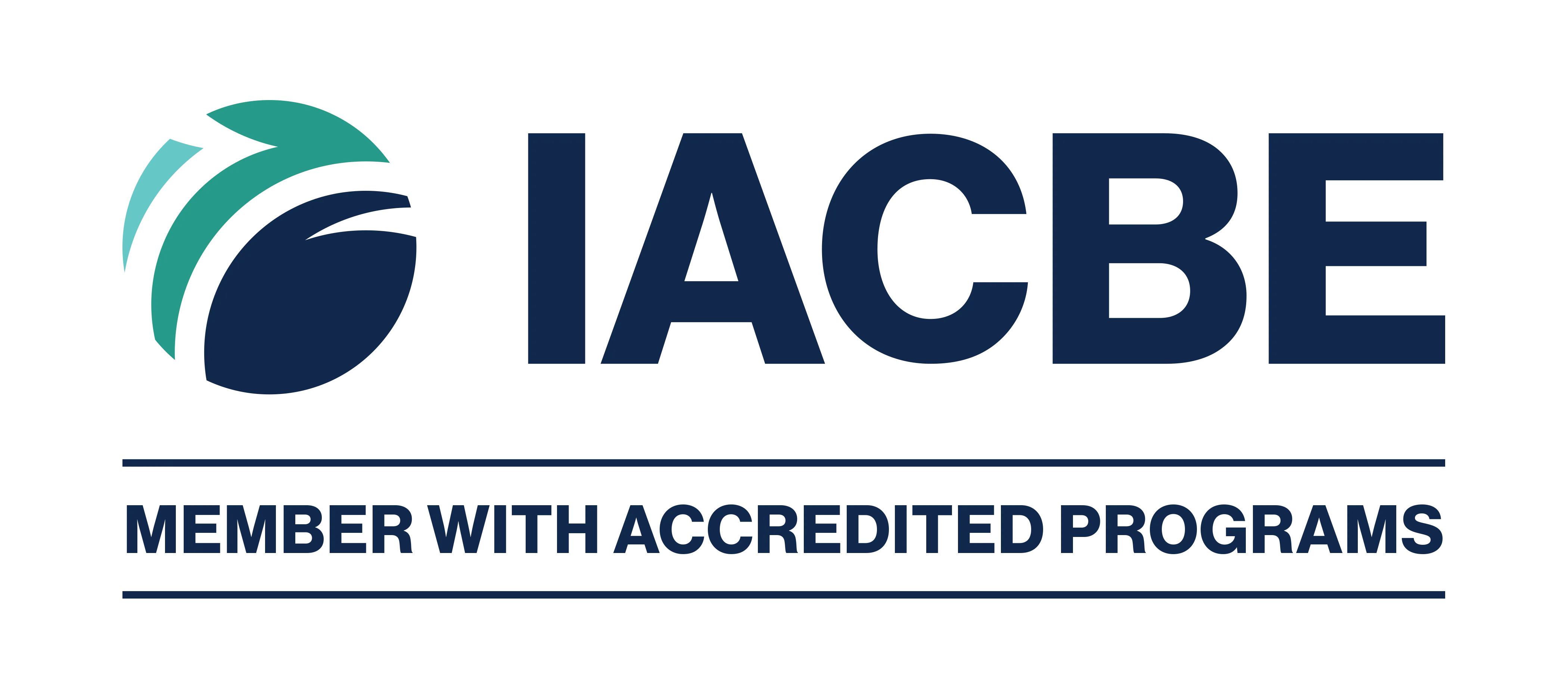Earn a bachelor's degree in accounting online, at your pace
| Accreditation | IACBE accredited program,✝ Accredited by the Higher Learning Commission |
|---|---|
| Transfer credit | Up to 91 approved credits |
| Format | 100% online classes you can take right at home |
| QuickPaths | Earn dual credit towards a Master of Business Administration; transfer credit, stackable credentials, and adaptive learning technology build a faster pathway to a higher education with Herzing University |
Learn More Today!

Ranked by U.S. News & World Report as one of the best online bachelor's programs in 2025
Discover new career possibilities in the field of accounting by earning a bachelor's degree education
The Bachelor of Science in Accounting degree is a 122-credit undergraduate program which prepares you for a career in accounting and finance.
The degree program provide students with fundamental knowledge and skills in payroll accounting, managerial cost accounting, auditing, and more.

Career-focused curriculum
Discover the crucial knowledge and skills required to succeed in your work and build a foundation for continued career growth.
Flexible schedule
We work hard to help you maintain school-life balance, striving to be as flexible as possible for busy non-traditional students.
Virtual services
Access to extensive virtual services, including academic advising, tutoring, support services, technical support and library services.
Lifelong support
We support your ongoing career advancement by providing comprehensive, personalized student services with lifelong career coaching.
Rolling admissions
No application deadlines to worry about. Apply when you’re ready and prepare to get started soon.
Bachelor’s degree in accounting classes & curriculum details
Our bachelor’s degree program prepares you for a challenging and rewarding career in accounting, including upper-level courses in financial accounting, auditing, taxation and cost accounting. Classes emphasizing the decision-making skills required to support and manage accounting activities, including inventory tracking and the preparation of financial statements and tax returns.
All classes are delivered online in a virtual learning environment with a required research project or internship (if allowed in your state).
| Program | Months i | Credit |
|---|---|---|
| Bachelor of Science in Accounting | 36 | 122 |
iAverage number of months for students to complete program
Program availability varies by location
Required Business Core Courses
All courses, 36.00 semester credit hours, are required.
Or BU 502 - Leadership and Team Dynamics Semester Credit Hours: 3.00
Or BU 631 - Project Management for Business Leaders Semester Credit Hours: 3.00
Or BU 421 - Operations Management Semester Credit Hours: 3.00
Or BU 520 - Integrated Economics and Decision-Making Semester Credit Hours: 3.00
Required Courses in Accounting
All courses, 42.00 semester credit hours, are required.
Open Elective Courses
A minimum of 3.00 semester credit hours of open electives is required. Students who are qualified to take dual-credit courses may also take approved graduate courses. * Students in the state of Alabama must complete 3.00 additional semester credit hours in a special-topics course in advanced auditing and 3.00 semester credit hours in a special-topics course in advanced taxation. AC 221 - Taxation II satisfies the advanced taxation requirement. Students in the state of Alabama must take AC 435 - Advanced Auditing to satisfy the advanced auditing requirement.
Dual Credit Courses
Eligible students can replace up to 9.00 semester credit hours of the core program requirements with approved dual credit graduate level coursework. A total of 12.00 graduate semester credit hours can be taken throughout the student's program. Graduate Program Applicable Dual Credit Courses Master of Business Administration Master of Business Administration in Business Analytics Master of Business Administration in Healthcare Management Master of Business Administration in Project Management BU 502 Leadership and Team Dynamics BU 520 Integrated Economics and Decision-Making BU 631 Project Management for Business Leaders
Required Capstone or Internship
3.00 semester credit hours are required.
Note: * Online students in some states may not be allowed to take this internship due to state restrictions.
Required Courses in General Education
Students enrolled in this bachelor's degree must complete a minimum of 36.00 semester credit hours in general education distributed among the following disciplines. Refer to the General Education section of the catalog for specific information about courses within each discipline. 12.00 Semester Credit Hours in Communications 9.00 Semester Credit Hours in Humanities (must include 3 semester credit hours of cultural diversity) 6.00 Semester Credit Hours in Mathematics 3.00 Semester Credit Hours in Science 6.00 Semester Credit Hours in Social and Behavioral Sciences
Personal and Professional Development Courses
2.00 semester credit hours are required.
Tuition & Cost
Tuition & Cost
The cost of tuition for the Bachelor of Science in Accounting program is $515 per credit.
You can potentially earn even greater savings by transferring credit from prior college coursework, applying for financial aid, or potential partnership opportunities through your employer.
Our goal is your career advancement. That's why we are always working to improve our curriculum and processes to make our program as affordable as possible while preparing you best for success in your work.
Scholarships & Financial Aid
You may be eligible for multiple scholarships and grants, both through Herzing University and several national scholarship websites.
Military/Veteran Discounts
Veterans, Active Duty U.S. Servicemembers, and spouses may qualify for a 10% tuition discount or tuition reduction to $250 per credit.
Waived Enrollment Fee
Discover the educational pathway designed to maximize your career potential. Reach for greater heights with Herzing University.
Save time and money by earning dual credit
Students enrolled in Herzing University’s accounting bachelor’s degree program can get a head start on earning a Master of Business Administration (MBA).
Qualifying undergraduate students who pursue a Herzing bachelor’s degree in accounting may apply up to 12 credits toward an MBA degree.



Admissions requirements
Prerequisites to enroll in the Herzing University Accounting bachelor's degree program include:
- Prior education requirement. Completion of high school diploma, GED, or equivalent.
- Entrance testing. Applicants must demonstrate the capacity to succeed in college-level courses via prior ACT/SAT scores, completion of prior college credit, or additional entrance testing.
- Availability of time, personal commitment, and a professional attitude. We exist to help enthusiastic students fully committed to reaching their highest career goals. Our faculty and leadership are dedicated to helping you reach them.
You will need to meet and interview with a Herzing University admissions advisor and complete an enrollment application to be admitted into the program.
If you have any additional questions regarding admissions into the program, please contact our admissions team.
- Alabama
- Alaska
- Arizona
- Arkansas
- California
- Colorado
- Connecticut
- Delaware
- Florida
- Georgia
- Hawaii
- Idaho
- Illinois
- Indiana
- Iowa
- Kansas
- Kentucky
- Louisiana
- Maine
- Maryland
- Massachusetts
- Michigan
- Minnesota
- Mississippi
- Missouri
- Montana
- Nebraska
- Nevada
- New Hampshire
- New Jersey
- New Mexico
- New York
- North Carolina
- North Dakota
- Ohio
- Oklahoma
- Oregon
- Pennsylvania
- Rhode Island
- South Carolina
- South Dakota
- Tennessee
- Utah
- Vermont
- Virginia
- Washington
- West Virginia
- Wisconsin
- Wyoming
- District Of Columbia
- Virgin Islands
Accreditation & Recognition
Our accredited & recognized online school
We strive to earn rank as one of the top private, nonprofit universities in the United States. Just as you work every day to become the best version of yourself, so do we as a university.
We are proud to have attained institutional and programmatic accreditation in addition to industry recognition for our accomplishments helping students earn a college education and find career success.

✝The Business Division at Herzing University has received specialized accreditation for its business programs through the International Accreditation Council for Business Education (IACBE) located at 11960 Quivira Road in Overland Park, Kansas, USA. For a list of accredited programs please refer to our IACBE member status page.

Ranked by U.S. News & World Report among the best online bachelor’s degree programs in 2025.
Herzing University is institutionally accredited by the Higher Learning Commission (hlcommission.org), a regional accreditation agency recognized by the U.S. Department of Education.
Waived Enrollment Fee
Discover the educational pathway designed to maximize your career potential. Reach for greater heights with Herzing University.
What can I do with a degree in accounting?
Earning a bachelor’s degree opens doors to many different types of career opportunities in the field of accounting in both the private and public sectors.
Possible jobs you can pursue with a bachelor’s degree include:
- Public Accountant
- Management Accountant
- Government Accountant
- Internal Auditor
- Budget Analyst
- Financial Examiner
- Tax Examiner
Job Outlook
According to the Bureau of Labor Statistics (BLS), employment of accountants and auditors is projected to rise 4% from 2022-2032.*
Now is a great time to begin working towards a degree to help you compete for jobs in a rewarding, diverse career field.
Note: to become a Certified Public Accountant (CPA), you will need to earn a bachelor’s degree and additional course credits, along often professional experience. State-specific requirements vary.1
BA vs. BS in accounting: what’s the difference? A BS in Accounting typically requires more courses related to the accounting major to emphasize preparation for entry-level positions in corporate, nonprofit, or government. A Bachelor of Science in Accounting (BA) usually puts more emphasis on elective classes and a broader liberal arts education.
How can I advance my career? After earning a bachelor’s degree you may consider pursuing an Master of Business Administration (MBA).
Faq
Frequently Asked Questions
Didn't find the answer to your question? Send us an inquiry and we will be happy to answer all your questions!
Yes! Because so many financial and accounting-related programs are online, it’s possible to work remotely as an accountant.
Keep in mind every employer has their own requirements and potentially might require candidates for entry-level positions to gain experience in the office before working from home.
The difference between finance and accounting is that accounting focuses on tracking the day-to-day flow of money into or out of an organization, while finance is the general management of assets and liabilities and includes future growth planning. The curriculums of their respective degree programs follow suit.
Additionally, if you would like to pursue your CPA, a degree in accounting is often the more preferred choice.
Accounting is much more specific to managing and analyzing money in and out of organizations. An accounting degree offers students in-depth knowledge to a range of advance accounting principles and processes.
Business administration is often limited to basic accounting principles. Instead, a degree in business administration focuses on many aspects of business, including operations, management, and business strategy.
Students choosing a business administration degree program with an emphasis on accounting and finance may learn big picture business principles while learning the fundamentals of day-to-day financial management and analysis.
While you may not be required to hold a degree to qualify for jobs that include bookkeeping and accounting tasks, employers may prefer earning a degree if you plan to become an accountant and continue advancing your career in accounting and finance. It’s difficult to obtain senior-level roles in accounting without earning an accounting-specific undergraduate degree.
Many states require that you must have a bachelor’s degree plus additional credit hours to sit for the exam to become a Certified Public Accountant (CPA). State-specific requirements may vary.2
Yes! All of Herzing’s accounting programs can be completed online on your schedule, at your pace.
There are many different types of accountants with varying levels of required education. You can potentially earn an education at the diploma or associate degree levels and qualify for certain types of entry level positions.
However, earning a bachelor's degree in accounting provides a broad foundational education you need to succeed in many types of accounting positions.
Program Finder
Bachelor of Science in Accounting
On Campus OnlineThis Bachelor of Science in Accounting program prepares students for challenging careers and positions of leadership in both private and public sectors. It offers upper-level courses in financial accounting, auditing, taxation and cost accounting and introduces students to multiple functional aspects of business in general. Upon completion of this program, students are able to apply computer, communication, and decision-making skills to management accounting techniques to support accounting activities. These activities include maintenance of accounting records, the preparation of financial statements, inventory tracking, valuation, and the preparation of tax returns.
This Bachelor of Science in Accounting program at Herzing University does not fulfill all of the requirements for a graduate to take the Certified Public Accountant (CPA) exam or apply for licensure as a CPA in most states/jurisdictions. Most states/jurisdictions require a specific amount of study beyond a bachelor's degree (typically, a total of 150 semester credit hours, but this varies by jurisdiction) as well as several years of professional experience working in accounting to be eligible to apply for licensure. Some states (including, but not necessarily limited to, Texas) require the program to have specific programmatic accreditation for graduates to apply for licensure as a CPA, which this program does not have at this time, and no representation has been made as to when or if such an accreditation will be obtained. Applicants interested in becoming a CPA should check with their state board of accountancy regarding CPA eligibility requirements prior to enrolling in any accounting program. Students planning to pursue certifications other than the CPA exam should also contact the respective certifying organization to confirm requirements for certification prior to enrolling in any accounting program. Certification enhances employment opportunities but is not a state specific requirement.
Request Information
Ready to get started?
Contact us to request more information
The Student Experience at Herzing
I faced many challenges during my studies, but with hard work and determination, I made it!
Stephanie Grover
Business Student | Online CampusI had searched different programs at other universities, but only Herzing offered the program that I had been attempting to find.
Jerrica Bosco
Business Student | Online CampusI'm excited about the future and ready for the next chapter in my professional journey!
Maya Herrin
Business Student | Akron CampusAccreditation & Disclosures
1. This Bachelor of Science in Accounting program at Herzing University does not fulfill all of the requirements for a graduate to take the Certified Public Accountant (CPA) exam or apply for licensure as a CPA in most states/jurisdictions. Most states/jurisdictions require a specific amount of study beyond a bachelor’s degree (typically, a total of 150 semester credit hours, but this varies by jurisdiction) as well as several years of professional experience working in accounting to be eligible to apply for licensure. Some states (including, but not necessarily limited to, Texas) require the program to have specific programmatic accreditation for graduates to apply for licensure as a CPA, which this program does not have at this time, and no representation has been made as to when or if such an accreditation will be obtained. Applicants interested in becoming a CPA should check with their state board of accountancy regarding CPA eligibility requirements prior to enrolling in any accounting program. Students planning to pursue certifications other than the CPA exam should also contact the respective certifying organization to confirm requirements for certification prior to enrolling in any accounting program.
Herzing University is accredited by the Higher Learning Commission (hlcommission.org), an institutional accreditation agency recognized by the U.S. Department of Education.
View Herzing University Accreditation and Approvals
* Bureau of Labor Statistics (BLS), U.S. Department of Labor, Occupational Employment and Wage Statistics 2023 / Occupational Outlook Handbook 2022. BLS estimates do not represent entry-level wages and/or salaries. Multiple factors, including prior experience, age, geography market in which you want to work and degree field, will affect career outcomes and earnings. Herzing neither represents that its graduates will earn the average salaries calculated by BLS for a particular job nor guarantees that graduation from its program will result in a job, promotion, salary increase or other career growth.
Recent Blog Posts
Waived Enrollment Fee
Discover the educational pathway designed to maximize your career potential. Reach for greater heights with Herzing University.







